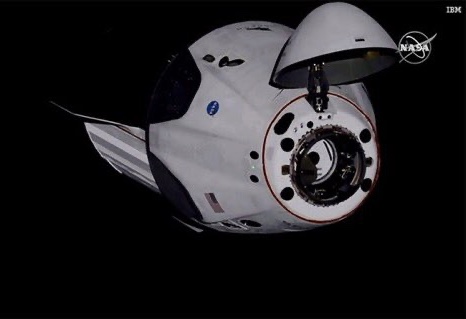OUTER SPACE—At 10:16 a.m. ET on Sunday, May 31, the SpaceX-manufactured Crew Dragon spacecraft docked onto the International Space Station (ISS), 13 minutes earlier than predicted.
The spacecraft launched atop a Falcon 9 rocket just under 19 hours ago at 3:20 p.m. ET from the Kennedy Space Center. Liftoff was originally scheduled to take place on Wednesday, May 27 but stormy weather delayed launch plans until Saturday, May 30.
“Dragon arriving,” said National Aeronautics and Space Administration (NASA) commander Christopher Cassidy. “Crew of Expedition 63 is honored to welcome Dragon and the Commercial Crew program aboard the International Space Station. Bob and Doug, glad to have you as part of the crew. Well done. Bravo Zulu.”
Cassidy is currently aboard the ISS, along with fellow astronauts Anatoly Ivanishin and Ivan Vagner.
Robert Behnken, 49, and Douglas Hurley, 53, are the two astronauts aboard Crew Dragon. Jim Bridenstine, the Administrator of the called the pair “America’s two favorite dads in space.”
They named the Dragon capsule “Endeavour” to commemorate shuttle Endeavour – on which both astronauts had their first flights. Behnken and Hurley also selected the name to acknowledge the “incredible endeavour” that SpaceX and NASA had undertaken.
“I know most of you, at SpaceX especially, know it as Capsule 206,” Hurley said over a space-to-ground video link a few hours after launch. “But I think all of us thought that maybe we could do a little bit better than that. So, without further ado, we would like to welcome you aboard capsule Endeavour.”
The mission is considered especially significant for several reasons.
- It is the first time that a private company – SpaceX – is launching NASA astronauts into orbit (or any astronaut, for that matter).
- It marks the first time that humans will be launched into outer space from American soil since 2011 – when the space shuttle was retired.
- It signifies the start of a “new era,” where NASA will start purchasing spacecraft and transport services from the commercial sector.
The journey was fully automated. During their time on the ISS – which is expected to last less than four months – Behnken and Hurley have been tasked with testing all systems in the Crew Dragon and relaying feedback to engineers on Earth.






